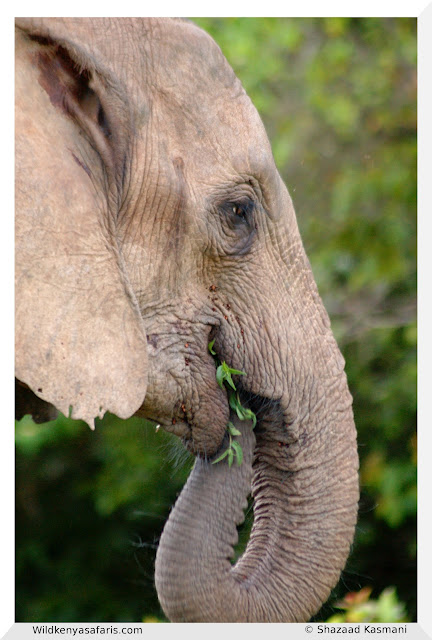 |
| A Tuskless Matriarch leading the way in Tsavo East National Park |
 |
| In Shimba Hills National Park |
elephants in the Tsavo ecosystem seem to be growing into adulthood
with much shorter tusks while some others have no tusks at all. A
common question I am asked is; where are the mighty tuskers that once
roamed Tsavo?
A very viable question which in reality is open to interpretation, but
for now, deserves an answer based on scientific research, historical
statistics and future predictions.
Quite typically, we can easily assume that most large tuskered
elephants have been decimated by human harvesting. Meaning, they have
been killed for either sport, consumption or commercial poaching.
But will we ever see these majestically armored elephant specimens in
the future?
Animals have been killed by people for food, clothing, medicine,
ornaments and the like from the moment mankind began. The most
sought-after more often than not, are the healthiest of the species.
The choice for a sport hunter or poacher to selectively target big
healthy elephants with large tusks, continuously for such a prolonged
period of time, may undoubtedly bring about some form of genetic
adjustment. A time comes when most healthy and attractive individuals
will have been removed, leaving behind the less desirable to reproduce
and further propagate the less attractive genes into future
generations.
It can possibly be suggested that elephants and other wild animals are
now evolving due to the dramatic change for their survival. They are
possibly mating earlier, becoming smaller in size and developing very
small tusks/armor or even none at all as a strategic tactic to stay
alive.
 |
| A Tuskless Teen in Tsavo East |
Could young female elephants now also be selecting younger, weaker and
less formidable males subconsciously? knowing that breeding offspring
with healthier males reduces the chances of survival for their
offspring? Again this is all open to interpretation but the fact of
the matter remains, the continued degradation of the environment and
depletion of prime individuals will unnaturally alter the future of
elephants and other wildlife in populous and genetics, forever!
Comments
Post a Comment